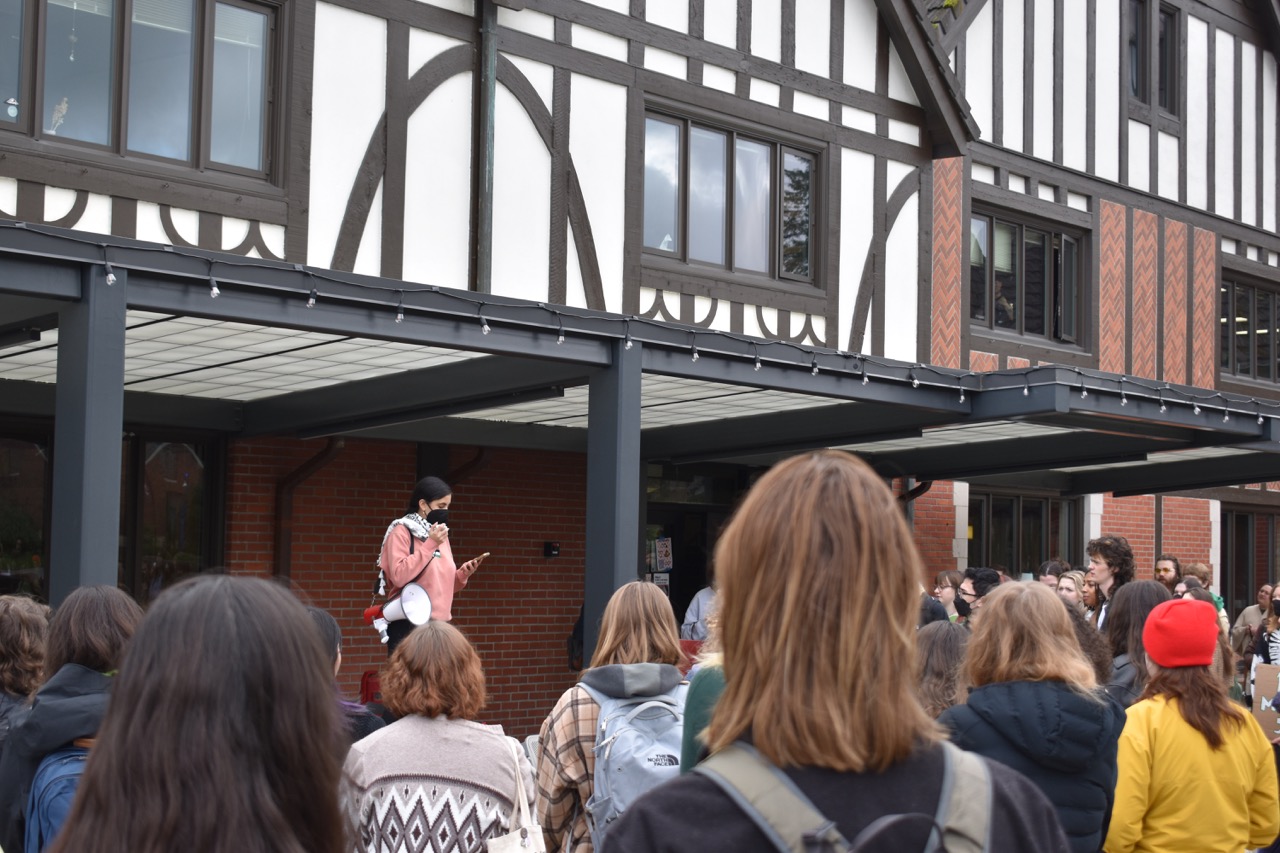North End Tacoma Students for a Democratic Society to Continue Advocacy Despite University Sanctions

By Mercer Stauch and Grace Farrell
North End Tacoma Students for a Democratic Society (NETSDS), formerly Puget Sound Students for a Democratic Society, resumed meetings under its new moniker. The transition comes in response to University sanctions against the organization following the disruption of its U.S. Representative Derek Kilmer’s scheduled guest lecture last semester. The group is required to adhere to new guidelines that limit what campus spaces and resources it can use, as well as how it can represent itself. It may no longer sponsor events or advertise itself as an ASUPS- or University-affiliated organization.
NETSDS, which is a local chapter of a larger national organization, narrowed its focus to Palestinian liberation last semester, but members aim to address injustice in all its forms. “We are not singularly focused on Palestinian liberation or divestment as a tool of that,” says member Annika Freeling (‘25). “Our goals are fighting the consequences of imperialism and capitalism and racism and various other structures of oppression.”
Freeling says that continuing advocacy for University divestment from Israel and companies who do business with them is a major agenda item in the coming semester and expects that NETSDS will facilitate this in part through teach-ins with faculty collaboration.“Boosting engagement through education is a big goal of ours,” she said.
In some ways, this contrasts with the advocacy strategies NETSDS employed on campus last semester. The group’s advocacy for Palestinian liberation included a weeks-long encampment on Todd Field in addition to the protests against Rep. Kilmer. To Freeling, that was the response the moment called for; encampments were happening on campuses around the country, and the group felt it had to push back against the harm the group alleged Rep. Kilmer’s presence would cause. “There were things to respond to, and so that kind of took the forefront,” she explained. NETSDS shared via Instagram over the summer that they plan to “protest and escalate” in the face of sanctions against their group. However, Freeling clarified the club currently does not have any protests planned.
Last semester, University President Isiaah Crawford articulated concerns about the potential use of violent and intimidating tactics by students affiliated with NETSDS during the protest against Rep. Kilmer. He noted in a campus-wide email that the right to protest is not absolute on campus, and is limited when campus safety is threatened. On Feb 26, he announced via email that the University planned to conduct an investigation into student behavior during the protest.
In the following weeks, University officials collaborated with Davis Wright Tremaine (DWT), a law firm based in Seattle, to conduct informational interviews with students, staff, and faculty about the protest. Information was evaluated in a hearing. Student behavior was evaluated against the Student Code of Conduct and other University policies, explained Vice President of Student Affairs and Dean of Students Sarah Comstock. “The process included a student integrity board, which has a faculty member, a staff member, and a student on it,” she explained. “This was a very thorough process.”
Freeling explained that NETSDS found parts of the DWT report “absurd,” including its reference to the January 6th assault on the U.S. capitol when describing the protest. “We were not armed. We were not trying to cause bodily harm to any individuals,” Freeling said. The club also objected to the use of anti-Black language in the report, which was the topic of a teach-in last semester co-hosted by the African American Studies, Politics and Government, English, and Environmental Policy and Decision Making departments. “The racially coded language and stuff like that was really hurtful to us,” she said.
The board generated three general sanctions for SDS, effective May 6, 2024. The group is prohibited from seeking formal recognition from ASUPS for one year and from organizing meetings or events on campus for two years. They were also instructed to remove Puget Sound from their name to demonstrate that they are not affiliated with the University.
NETSDS shared via Instagram that members Krishna Agrawal (‘27) and Lauren Garelick (‘27) were also personally sanctioned in the hearing process. According to the post, both members have been put on conduct probation for a year and are not permitted to hold leadership positions on campus. Krishna was also prevented from studying abroad and from playing on Puget Sound’s tennis team.
Freeling explains that NETSDS members are frustrated by this ruling in part because they feel as though Agrawal and Garelick were arbitrarily singled out. Freeling explained that when members speak at a protest, it doesn’t necessarily mean they are group ring leaders; Agrawal and Garelick brought the NETSDS chapter to campus, but the club’s leadership is communal and involves everyone equally. To Freeling, it’s inaccurate to pin the protest on those two alone. “There’s so much of a difference between, ‘this national organization isn’t here, it should be here,’ and ‘inciting violence,’” said Freeling. “There are ten oceans between that.”
Despite the new rules under which they are required to operate, NETSDS will continue to meet weekly this semester and intends to organize events. Regarding whether that will get members in trouble with the administration, Freeling recognizes “I don’t think that they’ll love it. And obviously, that’s something everyone who’s involved in the club has to recognize.”
